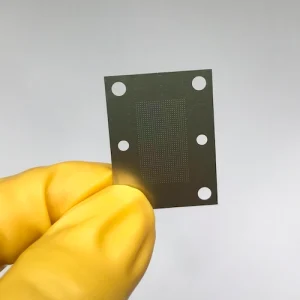Introduction to Micro Metal Fabrications
The fabrication of small metal parts through micrometal processing serves the electronics, medical device, and aerospace sectors. It is essential to choose the appropriate metal because it determines precise work alongside extended longevity and optimized operational capabilities.
Key Factors in Choosing the Right Metal for Micro Fabrication
Several significant aspects need consideration for picking the right metal to utilize during microfabrication. Machinability stands for the ability of the metal to receive precise shaping at microscopic dimensions. The metal demonstrates both powerful strength together with high resistance to wear because of its durability properties.
- Corrosion Resistance – Protection against oxidation and environmental factors.
- Electrical Conductivity – Important for electronic applications.
- Biocompatibility – Essential for medical implants.

Best Metals for Micro Metal Fabrication
Stainless Steel
The manufacturing industry chooses stainless steel for micro-scale applications because the material has excellent machining characteristics along with resistance to corrosion and great mechanical strength. The manufacturing industry uses this material for medical devices together with micro-structural components.
Aluminum
The metal aluminum combines lightweight properties with erosion protection capabilities with strong thermal conductivity capabilities. The metal proves optimal for both aerospace fields and microelectronics industries.
Titanium
The unmatched strength-to-weight properties and biological compatibility of titanium give it leadership status when used in surgical implants and aerospace structures.
Copper
Due to its excellent conductive properties, copper gets utilized for microelectronics along with precision electrical components to large extents.
Nickel Alloys
Nickel-based alloys offer excellent resistance to corrosion and heat, so they become the best material choice for demanding performance applications.
Advantages of Stainless Steel in Microfabrication
- Corrosion-resistant
- High strength
- Suitable for medical applications
Why Is Aluminum a Popular Choice?
- Lightweight and strong
- Cost-effective
- Good thermal and electrical conductivity
Titanium
- Strength and Precision in Microfabrication
- Superior strength-to-weight ratio
- Excellent biocompatibility
The industry sectors of aerospace together with medical utilize these materials.
The Role of Copper in Electrical Microcomponents
- High electrical conductivity
- Used in PCBs and microcircuits
- Efficient heat dissipation
Nickel Alloys for High-Performance Applications
- Superior resistance to corrosion and heat
- Common in aerospace and industrial settings
Comparing Metal Properties for Microfabrication
| Metal | Strength | Corrosion Resistance | Electrical Conductivity | Biocompatibility |
| Stainless Steel | High | Excellent | Low | High |
| Aluminum | Medium | Good | High | Medium |
| Titanium | High | Excellent | Medium | Excellent |
| Copper | Low | Poor | Excellent | Medium |
| Nickel Alloys | High | Excellent | Medium | Medium |
Industry Applications of Micro Metal Fabrication
- Medical devices (implants, surgical tools)
- Aerospace components
- Electronics and microchips
- Automotive precision parts
Challenges in Working with Micro Metals
- Material limitations at micro levels
- High precision requirements
- Expensive production techniques
Cutting-edge technologies in microfabrication
- Laser cutting and micro-milling
- Electroforming and etching
- 3D metal printing
Costs play an important role in selecting the optimal metal material. The material expenses differ according to the metal selection made.

Complexity of the fabrication process
- Bulk manufacturing vs. custom production
- Environmental Considerations and Sustainability
- Recycling potential of metals
- Energy efficiency in micro-fabrication processes
Why are TMN metal part fabrications better for metal microfabrications?
TMN Metal Parts Fabrication s positions itself as an industry-leading micro metal fabrication company through the combination of precision engineering and edge technology, along with a strong dedication to quality. The company applies laser and micro-milling combined with electroforming to achieve accurate results in every manufactured component. Every medical device aerospace component and microelectric part produced by TMN meets strict quality standards thanks to their advanced cutting expertise. Through their innovative approach, the company succeeds with complicated design projects that other fabricators find challenging to handle.
TMN stands out in micro metal fabrications because it chooses exactly designed high-quality materials to match industrial specifications. They choose metals such as stainless steel and titanium and copper and nickel alloys specifically for their strength properties and conductivity features as well as to prevent corrosion according to project requirements.
The court becomes meticulous concerning material selection to assure every piece achieves maximum performance during use. Every production stage is supervised by strict quality control at TMN which ensures all components manufactured satisfy both industry requirements and customer technical specifications.

At TMN Metal Parts Fabrications , the organization maintains both maximum efficiency and complete customer satisfaction as fundamental priorities. The business finds success by minimizing manufacturing times through their efficient system, which enables them to become a trusted supplier of high-precision microcomponents.
The company employs a professional team that provides custom fabrication solutions to address exclusive design needs by collaborating with clients to realize their conceptual notions. The excellence-based reputation of TMN establishes its position as an industry leader in various high-tech sectors through micrometal fabrication.
Conclusion
Choosing the best metal for micrometal fabrication depends on the intended application. Stainless steel, aluminum, titanium, copper, and nickel alloys all offer distinct advantages. Consider factors like durability, conductivity, and cost before making a decision.
FAQs
1. What is the most commonly used metal in microfabrication?
Stainless steel and aluminum are widely used due to their strength and versatility.
2. Is titanium better than aluminum for microfabrication?
Titanium is stronger and more corrosion-resistant, but aluminum is lighter and easier to work with.
3. Why is copper preferred in electronic micro-components?
Copper has excellent electrical conductivity, making it ideal for circuits and connectors.
4. What industries benefit most from micro metal fabrication?
Medical, aerospace, electronics, and automotive industries rely heavily on micrometal fabrication.
5. How does micrometal fabrication differ from standard metal fabrication?
Microfabrication involves creating extremely small components with high precision, whereas standard fabrication deals with larger structures.
